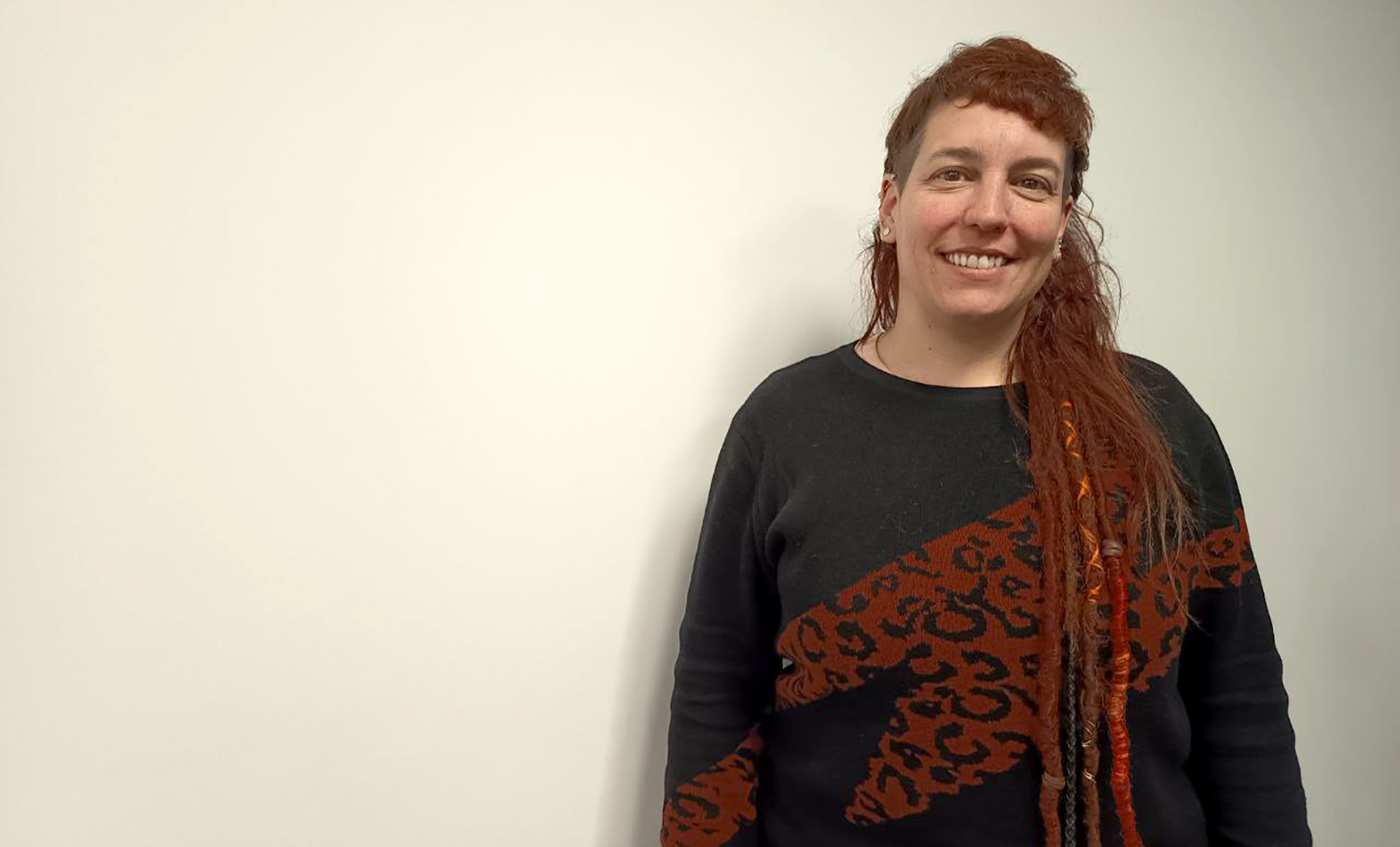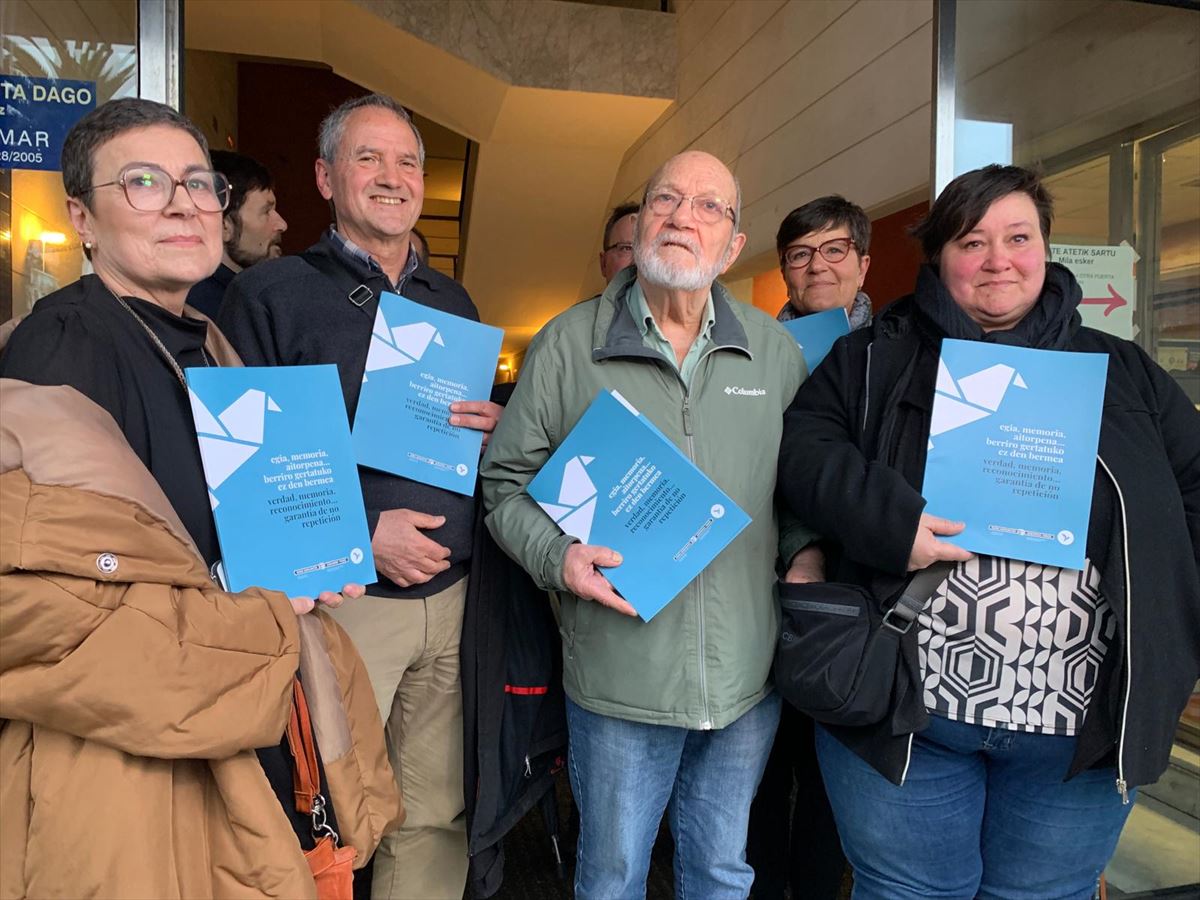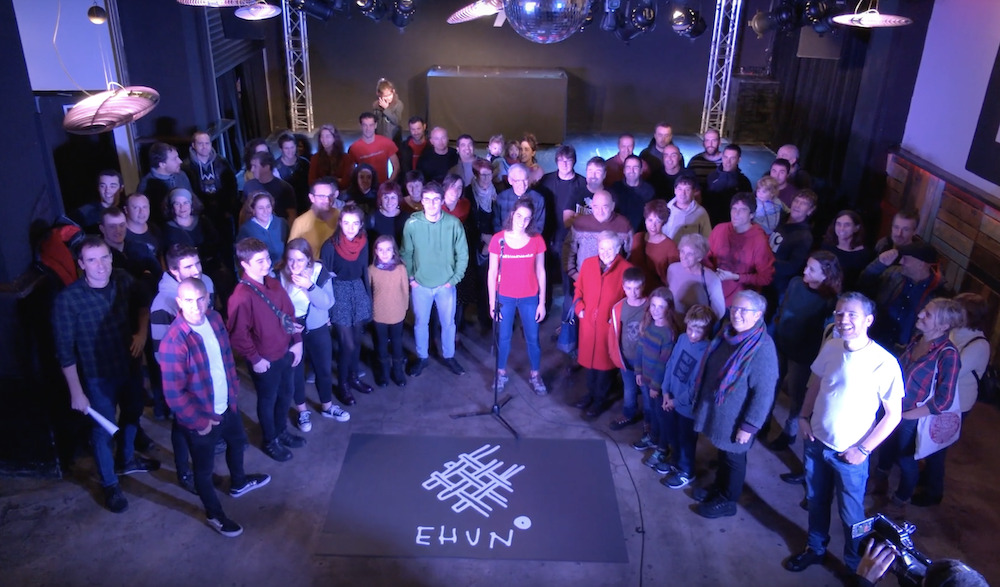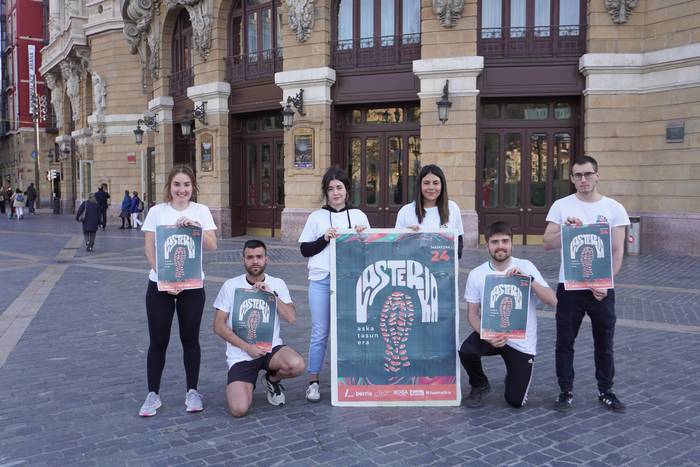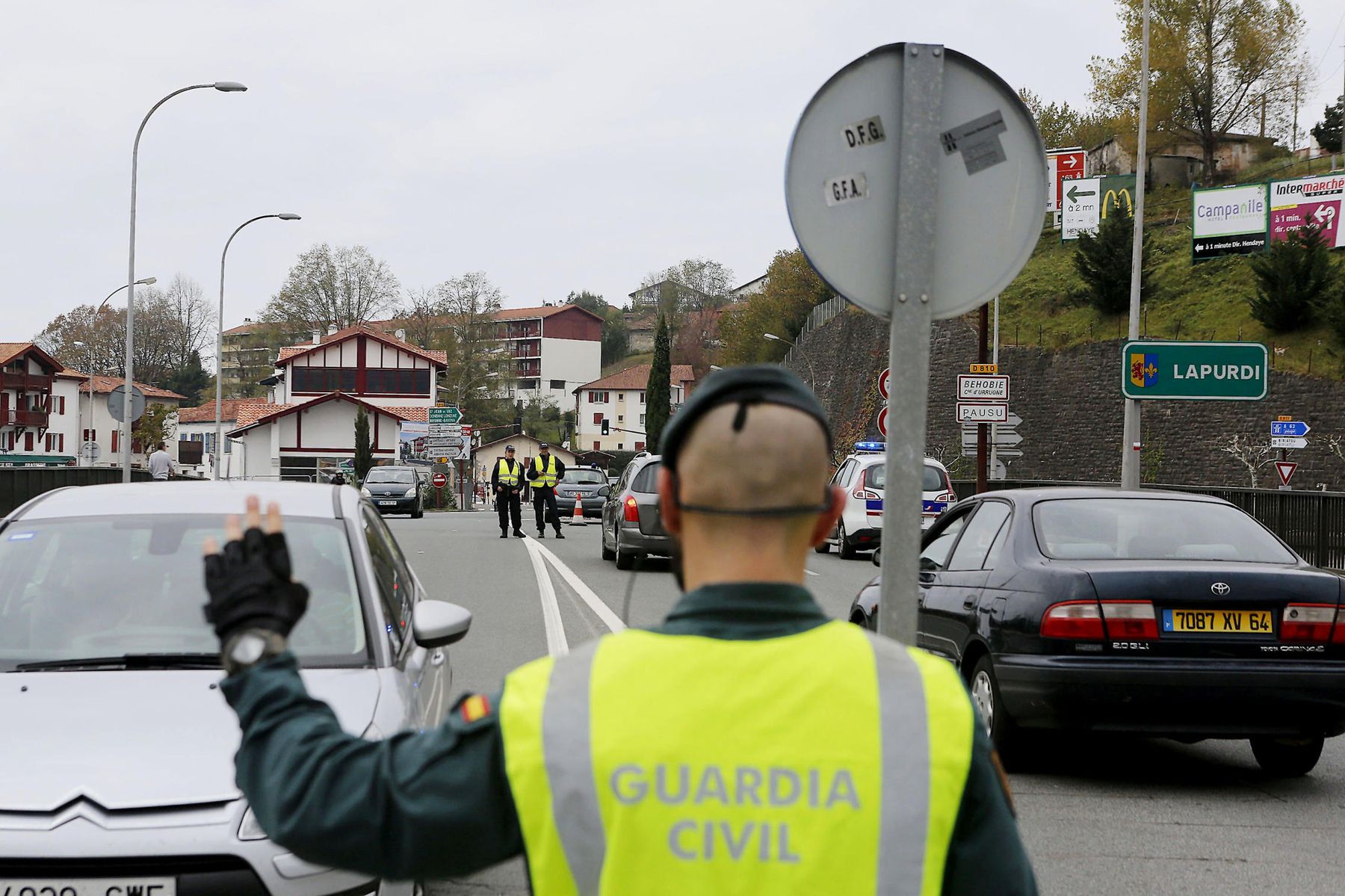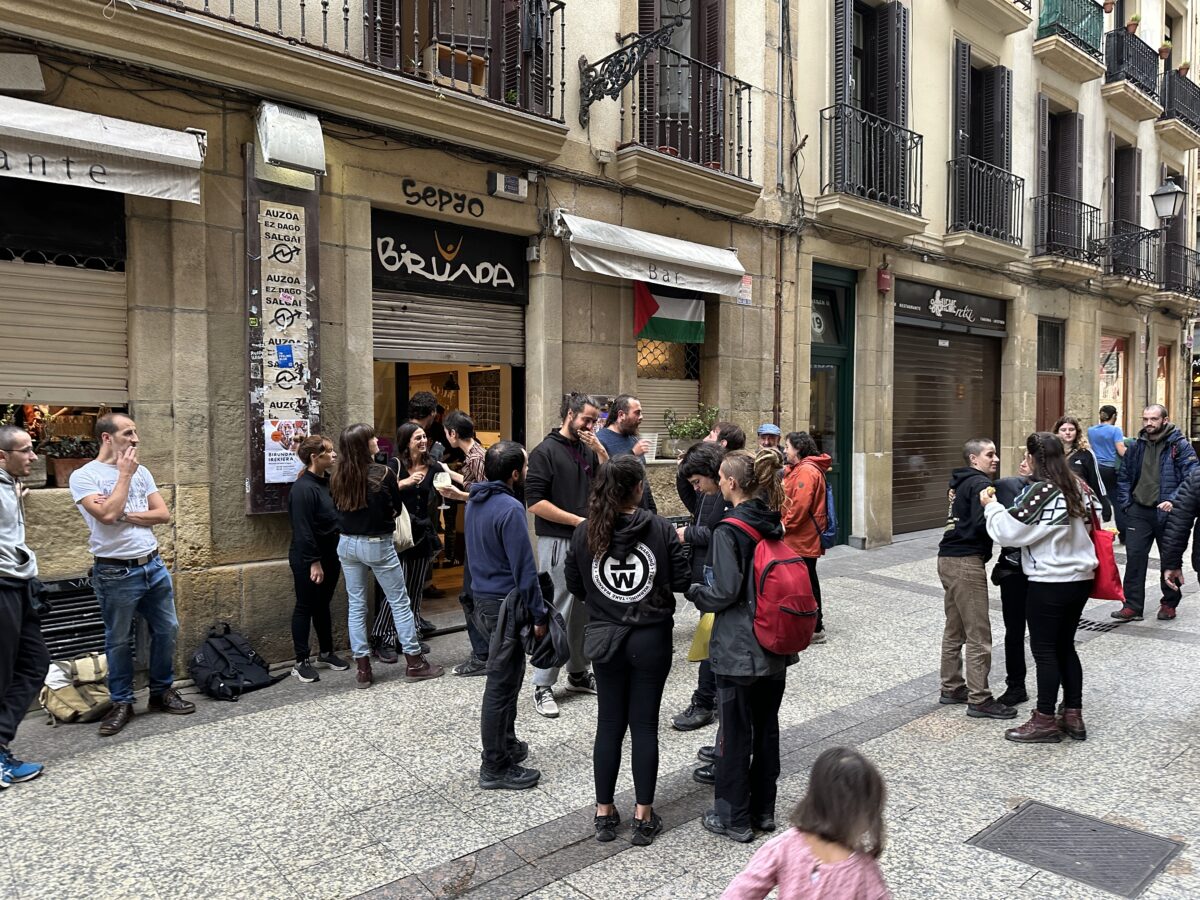"I want to convey the need for struggle, something new will emerge, it has always emerged"
- The inexpugnable writer, editor and entrepreneur Jose Mari Esparza has welcomed us in his work corner, in the cradle of Altaffaylla Kultur Elkartea and the editorial Txalaparta. During his youth he worked for 20 years at the Luzuriaga factory in Tafalla and has recently been diagnosed with pleura cancer by inhaled asbestos dust. In addition to his entire trajectory, he tells us in the interview what he is doing in the last months of the world. At the end we see singing in the adjoining room, between the shelves, in a low voice, probably one of those little heretic jotas that he picks up. His smile has given us a book and a map of the old Basque Country.

José Mari Esparza Zabalegi. Tafalla, 1951
Editor, writer and activist, red and independentist. In 1980, he published his first works on Tafalla's history and collaborated with José María Jimeno Justa in the regional investigation. In 1985 he founded Altaffaylla Kultur Taldea with several colleagues to work the historical memory. Since 1988 he has been director and editor of the editorial Txalaparta until recently. Among other associations, she was one of the creators of the Navarra Heritage Defense Platform. He has written hundreds of articles and about 30 books alone or in collaboration with other authors. For example, Navarra 1936. From Hope to Terror (Navarra 1936. From hope to terror), the milestone of historical memory.
How are you?
I do well and better asbestos.
You've always been a passionate, red, pro-independence entrepreneur and you packed up very young in the fight. How and why?
I was born, lived and worked my whole life in Tafalla. Ours is a very varied border place: between Ager and Saltus Vasconum; linguistic boundary; border between stone and adobe; place where the olive (Olibardia) and fern (Iratxeta) are kissed; military border, both with Arabs and liberals in the 19th century, and today also political border: It was the border between those who said yes or no to NATO and now in this legislature, as in the previous one, we have EH Mayor Bildu in Tafalla.
When I was young, my grandfather was a casual worker and had to go out and throw stones to defend the community. Then they emigrated to America and, fortunately, returned, otherwise I would now be singing tangos. Thanks to them I had memories of the republic and the great repression that was activated in 1936. My grandparents told me the historical memory of the left with their stories.
On the other hand, I have not distanced Basque culture, because in my country there has always been a Basque trend. As a child, when the Angel of Aralar came, they made us sing "Mikel, Mikel gurea / Gorde, gorde / Euskal Herria". We didn't know what that was. We thought it was Latin. Then when I was 14, I got into a dance group after a girl, but the girl left and I stayed. I stayed forever in the Basque culture and began to learn Basque.
After studying at the Salesians College in Pamplona, at the age of 17 I entered the Luzuriaga foundry, where I worked for 20 years in the trade union and trade union fields. The workforce of this 1,200 workers workshop was new and strong and we met the anti-francoist organizations. ETA fascinated us and reorganized the entire mental archive, suddenly we were left, republican and nationalist, all at once and without separating.
The truth is that my family’s history is very common among its humble inhabitants: Carlist great-grandparents, community and ugeist grandparents, parents silenced by Franco and we nationalists.
He became an entrepreneur and intellectual after 20 years in the factory…
Yes, the two figures that most odiaba.Un group of trade unionists and factory workers created the Altaffaylla Cultural Group. Our first work, Navarra 1936. From Hope to Terror (Navarra 1936. From hope to terror, it was a tremendous job that has then been a reference in the historical memory in Navarra. We showed that workers could create tools to tell the story, and we were very proud of it. We must not wait for intellectuals or universities to recover our memory: we must do it ourselves.
“’Navarra 1936. With ‘From Hope to Terror’ we proved that workers could create tools to tell the story and we felt very proud of it.”
Then, when we took the editorial Txalaparta, we started publishing encyclopedic works about the last hundred years of our history. Later we created the Basque Memory Foundation with the same objective, to collect data from all of Euskal Herria. Memory is a framework of struggle. This has always been our most important work and has been carried out in few villages. We've been with many other editors around the world, and when you see an encyclopedic play about the Basque struggle in 50 volumes, you're surprised.
.jpg)
Txalaparta turns 35 this year. What was your way?
We brought to the world of the edition the societal and socialist feelings we had in the factory with the txalaparta. We've published about 1,500 books in these 35 years, and we've reinvested everything we've gained in new projects. The last one, that of Pamplona, is a branch. That must be made clear. The cradle, the official headquarters and the warehouse are in Tafalla. And I'm glad that there are very good and militant people working in the same spirit as us.
I tell the new editors that we have to talk and discuss all the issues. And we have to flee from the “politically correct” thought or the dominant ideology, because it is the ideology of the upper class, as Marx said. Today there are many taboo subjects among us. We must freely discuss feminism, mass migration, the historical role of ETA, the war in Ukraine or the reason for the low birth rate in Euskal Herria, without subjecting ourselves to the dominant discourse.
Perhaps this is difficult because we live in the age of headlines, without the possibility of deepening our ideas?
Of course. That's the biggest problem we have: young people are losing the ability to dig deeper into a subject and read a 300-page book. That is worrying. Books aren't just hobbies, they're a mental exercise, and if you don't develop that capacity, you atrophy like muscles. If you can't get into the depth of a book, your thinking has become fragile and then you will always win the slogan. And the slogans capitalist system has more resources. In addition, left-wing ideas are very good and now they are all ecologists, feminists, pacifists, humanists and progressives. It's very difficult, and I think the new editors in the world have a huge challenge in publishing the necessary books.
"Regarding Basque Country, in the medium term I am pessimistic. We are too small and we also have no tools to manage the changes that come.”
Are we losing that battle? Where are humans going?
I am very pessimistic. Maybe it's because of my illness, but I can't help but see the world with a rather messianic look. We are no longer deceiving ourselves. I am surprised at what is happening in Gaza, for example. I never thought I was going to see it. But the worst part is that everybody is watching directly on television and it's amazing how we're getting used to seeing that. In all this there is a subliminal message: this is what will happen to all those who rise up against the system. It can and is happening. It's very hard. And the left is very weak. My hope is that NATO will be defeated in Ukraine or anywhere, than EE.UU. It's coming in decline and a multipolar world is emerging in which workers and small towns can find other kinds of slits to lift the next utopias as.Pero now we have no wind in favor, as Etxebarrieta [Txabi] said.
.jpg)
What about Euskal Herria?
With regard to the Basque Country, in the medium term, I am even more pessimistic. We are too small and also have no tools to manage the changes that come. We are the country with the lowest birth rate in Europe. To put it somewhat, we are a people that disappears. However, other inhabitants will be represented, as white men represented Indians in America. Of course, there will always be a small group that speaks the language of the Sioux, or the Basque, that will play the ball for the enjoyment of tourists. That's already happening in Iparralde.
What is called multiculturalism is a trap induced by elites, because they seek a single type of individual: consumerist and precarious laborer. And linked to the global ‘Big Brother’ via mobile phone and Anglo-Saxon culture. Tradition, family, trade unions, languages, memory, beliefs, nations, ethnicities… in short, everything that generates social cohesion is left to the system.
I always remember the phrase of a friend, the great American editor André Schiffrin, about diversity: “From a colorful fish tank you can make a fish soup, but it’s very difficult to do it backwards.” And we've known a world with thousands of different fish, one of them the Basque. The cultural diversity they propose to us is fish soup.
"Euskal Herria needs a great incentive. A new era of social, political and cultural upheaval, as occurred in the late nineteenth century or as our generation lived from 1958"
Basque Country needs a great incentive. A new era of social, political and cultural upheaval, as occurred in the late nineteenth century or as our generation lived from 1958 onwards. The Basques have always survived because they have fought for their freedom, their culture and their language. Normally against current. We would disappear if the new generations of Basques were subjected to conformism and dominant ideology. It would fulfill Xaho's nightmare and somebody would write in the atlas of the world. "Here was Baskonia."
I want to convey the need to fight. Something new will emerge. It's always been born.
He has worked hard to defend the unregistered heritage of the Church on his behalf. How is that battle going?
That's the biggest scandal I've ever met. From Navarre we managed to show this great theft of the history of the Basque Country and of the whole State. All the religious heritage built by the peoples, their houses, lands, cemeteries, frontons have been unregistered in their name. Everyone has given us reason, including Europe, but, despite the promises to regain that heritage during the election campaign, the PSOE has once again done Cervantes’: "We met the Church."
What surprises me most is that we have been able to put the bishops in panties (with the issue of pederasty), but nobody has been able to put their hand in the place that hurts them most, the pocket. In Navarre at least we have left some instruments of struggle (popular platform, municipal commission, parliamentary agreements...), but in the rest of the Basque Country they seem not to give it much importance. Just yesterday a mayor of Gipuzkoa wrote to me asking for help and advice.
There is an urgent need for a national platform that brings together the institutions involved and the movement of citizens to advise, mobilize and litigate until everything stolen is recovered.
In his last book he defends the song Gernikako Arbola as the hymn of Euskal Herria. Why?
For many reasons. We are a country with lice memory. We are increasingly ruthless and fragmented after the institutional breakdown of 1981. The Basques live comfortably with their political status, they are “Euskadi”, nobody denies them they are “Basques”, they have ikurrina... And many forget that we are seven provinces. That is why this initiative has emerged especially from Navarre, Iparralde and the diaspora, because the sense of our territoriality remains more alive. All historians of the Basque Country agree that it is the true anthem of our freedoms.
The Arbol de Gernika has an epic, bloodshed, history of ancient struggles, from the workers of Gallarta or Eibar to the Donostian massacre of the Civil Guard. Some say that it is religious, not knowing what its origin is, and from the first socialists to the first ETA all have recognized that it is the most secular and internationalist hymn. And, for example, it was the song in Basque that was most sung in the Ribera de Navarra. Anarchists returned to Esperanto as a libertarian anthem. The hymn was the symbol of all the Basques of Gernikako Arbola, which put him in the target of fascist bombs. It is therefore the most internationalist symbol we have.
GERNIKAKO ARBOLA
"Some say it is religious, not knowing what its origin is, and from the first socialists to ETA all have recognized that it is the most secular and internationalist hymn"
The curious thing is that all the Basque parties are constantly talking about "nationalism", and what since 1853 has been considered as a national anthem, in all territories and in all political currents, when there is a concrete proposal to sing, some begin to look elsewhere. Because there may be many new proposals, and let us not forget that [Ricardo] García Danborenea also proposed From Santurce to Bilbao as a hymn in the Basque Parliament. Only from the
lack of knowledge can we leave what was a national hymn of 170 years. It would be like putting Irulegi's hand into landfill.
.jpg)
Now, what are you working on?
Fortunately, I have had time to put things in order. I've been able to finish two books that I've been working on for years. One, Imago Vasconiae, the first historical atlas of the Basque Country. It is a work of pride. The other, about Zumalakarrangi and the Basque independence of the time. Then there is the transfer of everything I've managed: companies, foundations, associations, archives... Meanwhile, I keep going to the mountain, singing with my friends, and I manage the black humor left over from my father and grandfather. The Basque Country has made me very happy. I'm happy.
"On the occasion of asbestos, between chemotherapy sessions and wills, I have been forced to take
the banner again"
Anyway, if you're struggling and you're fighting to the last minute, right?
I didn't think that at the last moment and so closely, I was going to see capitalism's ugdest face. In this fight for asbestos thousands of people in the Basque Country are being infected, not knowing that the cause is an occupational disease caused by asbestos.
The tactic is very simple: let the time pass so that those affected will die and they cannot start any action. Thus, Social Security asks my old company to prove that I have worked for 20 years (although this is collected in my working life) and the company tells them that they do not know me after three months. It is a scandal. And if that's what they do to me, that everybody knows me, that I'm still OK, and that I have the means to report it, what are they not going to do to many former colleagues who are older, less healthy and less resourced? In the asbestos problem there is a lot of injustice and many loose criminals.
So in the final straight, instead of being quiet, I was forced to return to my trade unionist. Between chemotherapy trials and wills, the banner is again forced to be taken. Let them be cursed!
Azken aldian, asteburuetan, Internet ez dabil ondo. Hasieran, zaila zen webguneei ezarritako blokeoen zergatia ulertzea; orain, badakigu Espainiako La Ligak agindu zituela, futbola modu ilegalean emititzea saihesteko. La Ligaren blokeoak euskal domeinuei eragiten dien... [+]
Topatu eta topa! Tipi-tapa, elkarrekin ekin eta, bidea, eginean egin aurrera. Mahaiak, aulkiak, koadernoak eta boligrafoak, platerak, konfidentziak, tragoak eta ahotsak, eskuak, ideiak eta barreak, borrokarako besarkada gozoak. Txistulariak bileran, erraldoiak lasterka eta... [+]
Martxoaren 14an Donald Trumpek agindu exekutibo bat sinatu zuen, hainbat berri agentziak jasotzen duten diru kopurua asko murrizteko. Kaltetuetako bat United States Agency for Global Media (USAGM) izan zen eta, ondorioz, Voice of America (VOA), Radio Free Europe/Radio Liberty... [+]
Fusilamenduak, elektrodoak eta poltsa, hobi komunak, kolpismoa, jazarpena, drogak, Galindo, umiliazioak, gerra zikina, Intxaurrondo, narkotrafikoa, estoldak, hizkuntza inposaketa, Altsasu, inpunitatea… Guardia Zibilaren lorratza iluna da Euskal Herrian, baita Espainiako... [+]
Kritika artean abiatu dira Gasteizko Arana klinika zena Nazioarteko Babes Harrera Zentro bilakatzeko obrak. Ez auzokideak, ez errefuxiatuekin lan egiten duten gobernuz kanpoko erakundeak, ez PSEz bestelako alderdi politikoak ez daude ados proiektuarekin: makrozentroen ordez,... [+]
Horrela adierazi du Mikel Jauregi Industria, Trantsizio Energetiko eta Jasangarritasun sailburuak.
Non daude talka handienak eta zenbateraino dago gertu akordioa, EAEko hezkuntza publikoko irakasleentzat? Greba ziklo luzeari amaiera emateko sukalde lanaren eta gakoen inguruan mintzatu gara, STEILASeko bozeramaile Haizea Arbiderekin. “Grebak bertan behera utziko... [+]
Ekrem Imamoglu Erdoganekein lehiatzekoa da hurrengo presidentetzarako bozetan, CHP Herriaren Alderdi Errepublikanoa alderdiaren hautagaitzara aurkeztu den bakarra baita. Ustelkeria eta "terroristekin kolaboratzea" egotzi diote, eta bere atxiloketaren ostean piztutako... [+]
Azken astean ezagutarazi moduan, Eusko Jaurlaritzaren Balorazio Batzordeak txosten banatan aitortu ditu estatuaren biktima gisa. Justizia sailburuak ekitaldi pribatu banatan entregatu dizkie dokumentuak.
EAEn BAMEa (famili medikuen formazioa) lau urtetik hiru urtetara jaistea eskatu du Jaurlaritzak. Osakidetzaren "larritasunaren" erantzukizuna Ministerioari bota dio Jaurlaritzako Osasun sailburu Alberto Martinezek: "Ez digute egiten uzten, eta haiek ez dute ezer... [+]
Independentziaren aldeko ekimenak aurrera eramateko baliabide faltagatik "itzaliko" da. Aurretik, Euskal Herri osoko 101 udaletan independentzia mozioak erregistratuko dituztela iragarri dute, euskal errepublikaren aldeko prozesuan urratsak egiteko. Baliabide faltaz... [+]
Kirola eta aldarrikapena uztartuz, maiatzaren 24an Bilbo gazteria independentistaz beteko da. Lasterketa honen bitartez, Euskal Herriaren askatasunaren aldeko balioei lekua egin nahi diote gazteek, independentziarako bidean daudela erakutsiz.
Guardia Zibilaren historia bat - Hemendik alde egiteko arrazoiak izenburupean, datorren astean argitaratuko dugun 305. LARRUN aldizkariaren pasarte batzuk dira ondorengoak, erakunde armatuaren sorrera garaietan girotutakoak.
Rosa Zarra Ertzaintzaren pilotakada baten ondorioz hil zela da Eusko Jaurlaritzako Poliziaren Biktimen Balorazio Batzordeak atera duen ondorioa, Berria-k jakinarazi duenez. Orain arte, Ertzaintzak beti egin dio uko bertsio horri, eta Rosa Zarra berak zuen gaixotasunaren ondorioz... [+]
Ustez, lokalaren jabetza eskuratu dutenek bidali dituzte sarrailagileak sarraila aldatzera; Ertzaintzak babestuta aritu dira hori egiten. Birundak epaiketa bat irabazi du duela gutxi.

















